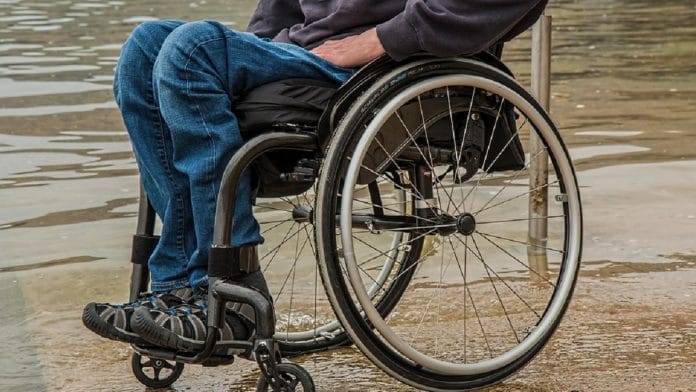From GST to buses, trains and flights, policies ignoring the disabled community constitute active discrimination.
I was glued to my TV on 6 October when finance minister Arun Jaitley and other senior officials started addressing a press conference following a meeting of the 22nd GST Council. Persons with disabilities (PwDs) were expecting that the decision to tax disability aids (that were earlier tax exempt) under GST would be reversed. After all, what sense does it make to tax aids for the disabled that are equivalent to walking, seeing or hearing?
Sadly, it wasn’t long before my enthusiasm turned into disappointment. Khakhra, unbranded namkeens and ayurveda became cheaper. A panel was formed to rework GST rates on restaurants. However, disability had been forgotten.
We must now seek to expand the meaning of the word “discrimination” in the Constitution because ignoring the disabled community constitutes active discrimination.
The GST example is not the first time, nor is this the first government to have ignored the disabled. In December 2015, when the Delhi government had announced the ‘odd–even’ rule to curtail traffic and in turn pollution, PwDs had faced a similar challenge.
Many had written to the chief minister urging him to grant them an exception considering the lack of accessible public transport systems in the city. Television channels dedicated airtime to highlight the lack of accessible buses, pavements and footpaths.
The simple argument was that while the ‘odd–even’ policy would encourage others to use public transport on alternate days, it would only restrict the disabled to stay at home every other day. Sadly, the Delhi government completely ignored our requests and with a week to go for ‘odd–even’ to come into force, it was the Delhi high court that asked the Delhi government to exempt the disabled.
Unfortunately, the Delhi government has not learnt its lesson. Last month, the government announced its plans to procure 2,000 standard floor buses (as against the accessible low floor buses) of which 1,000 would be for DTC. The estimated expenditure on the 1,000 DTC buses is Rs 330 crore. Such investments are not made everyday and these buses will be on the roads for at least a decade. But the accessible option wasn’t even considered.
Moving from roads to trains, the situation is even more pitiable. Stations are almost never accessible, platforms aren’t designed keeping the disabled in mind and coaches aren’t broad enough for a wheelchair to enter.
Mumbai resident and fellow wheelchair user Virali Modi is someone who has been a frequent traveller by train. Since she can’t enter the coach on her wheelchair, she is dependent on coolies.
One guy normally holds her between her legs from underneath her knees, the other grabs her placing his hands underneath her armpits. If that isn’t humiliating enough, she has reported three independent incidents of being groped with the coolie’s hands repeatedly reaching her breasts.
Suvarna Raj, a Delhi-based wheelchair user, was travelling on the Nagpur–Nizamuddin Garib Rath when she had to sleep on the floor after railway officials and fellow passengers refused to give her a lower berth in place of the upper one she was allotted.
India is investing Rs 1.1 lakh crores in the bullet train project but can’t give 26 million Indians the basic dignity of flight. Air travel has its own challenges with a lack of ambulifts, interdepartmental headaches and poorly maintained wheelchairs by airlines.
With the national anthem becoming mandatory before movie screening at theatres, even watching a movie has become a nightmare for PwDs. Salil Chaturvedi, a wheelchair using resident of Goa, was assaulted by the audience at a theatre for being unable to stand up for the national anthem.
Instead of sending a strong statement punishing the guilty, the home ministry came up with guidelines on how the disabled should be ‘trained’ to respect the national anthem. Luckily, sense prevailed and the guidelines have been reversed.
Last month, Arman Ali, a wheelchair user friend from Assam, had taken his nieces and nephews to the theatre to watch a movie. Two old men sitting behind him started yelling “Saamne ek Pakistani baitha hai”.
Earlier this year, the Supreme Court came up with an extremely progressive decision safeguarding the right to privacy for Indian citizens. And that brings me to Article 15 of the Constitution. Quoting from India’s holy grail – the articles clearly state that “the State shall not discriminate against any citizen on grounds only of religion, race, caste, sex, place of birth or any of them”.
Seventy years on, perhaps it’s time the Supreme Court expands the interpretation of this definition to include India’s disabled population and give them the constitutional recognition generations of governments have failed in delivering.
I have recently filed a PIL in the Supreme Court demanding an exemption of Disability Aids from GST and an expansionary interpretation of Article 15 to include disability.
Nipun Malhotra is the Founder of Wheels For Life, and disability rights advocate.







If Congress is voted to power the terrorists or jihadis will have a field day and will main many more by terror attacks. Congress Party is always soft to terrorists which belong to its vote bank.
Disability AIDS are luxury items, that’s why govt taxed these items, what an hypocrisy…..
Absolutely…All the disability AIDs should be exempted from GST. All these devices and instruments are making them move around and live like a normal citizen. Unfortunate that the Govt is discriminating them by imposing 5% GST. Infact the Government should extent additional subsidies for these instruments and make them more closer to the rest of the crowd.